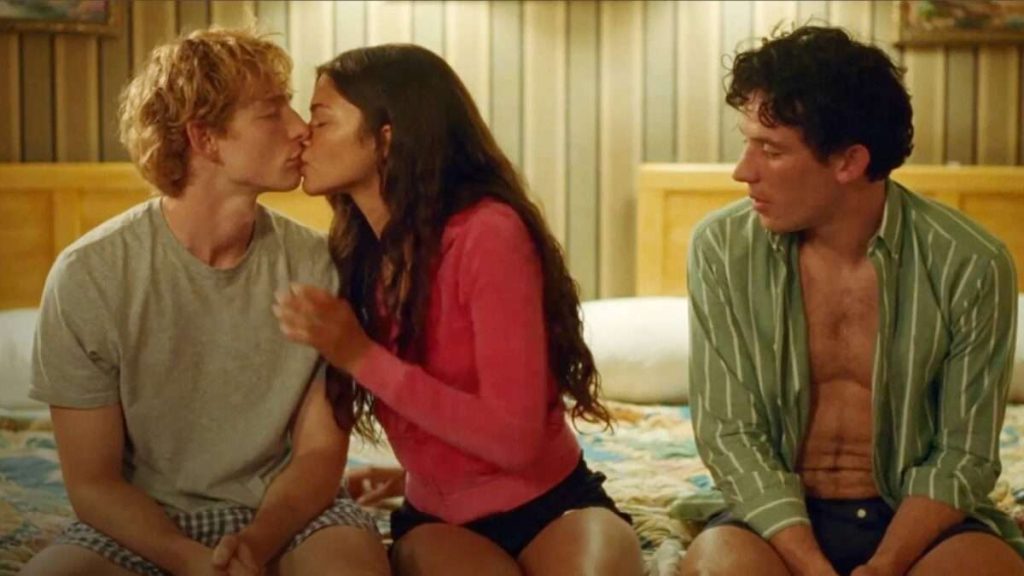For the last decade or two, Hollywood, like the rest of America, has been marked by a sex recession. Depictions of lovemaking, not long ago a fixture of big-screen productions, all but went away. Nudity practically disappeared, especially in big-budget productions. The number of studio-produced romantic comedies dwindled. Children’s films dropped lovestruck princess plots that resolved in weddings for journeys of empowerment and therapeutic self-discovery.
There were myriad reasons for the shift: Some of it was a product of #MeToo, and a growing sense that on-screen sex and nudity were both unnecessary and exploitative. Some of it resulted from the rise of superhero movies and the decline in films targeting adult moviegoers. Ironically, the shift occurred in concurrence with changes in physical appearance, especially among male leads, who bulked up and got shredded for larger-than-life superhero roles. The result was a curious on-screen world in which, as one writer put it, “everyone is beautiful and no one is horny.”
So it is somewhat jolting to see a movie in which everyone is beautiful and also very, very horny. Indeed, sexual desire, and the way it infuses so many aspects of one’s life, is the subject of Challengers. It’s a delirious, delightful, love-triangle romp—not only the horniest tennis movie you’ll ever see, but the horny tennis movie Hollywood needs.
Directed by Luca Guadagnino from a screenplay by Justin Kuritzkes, Challengers tells the story of three ambitious tennis players who love and lust for each other. There’s Mike Faist as Art Donaldson, the studious nice guy of the group. There’s Josh O’Connor as Patrick Zweig, the charming-but-erratic striver who can’t quite get his act together. And connecting the two, there’s Tashi Duncan, played by Zendaya, a should-have-been superstar who switched to coaching after an injury derailed her tennis career.
Kuritzkes’ script flitters back and forth in time, taking viewers from the moment the trio first meets at a juniors tournament to the peak of their careers, showing the trio coming together and coming apart. The nonlinear narrative, which spans a decade or so, captures the ebb and flow of desire and the ways it can turn into an obsession over time.
Zendaya’s Duncan is the pendulum that swings between the two male leads, but it’s clear they’re competing for more than just her attention. A crucial scene, early in the movie, depicts the trio perched on a hotel bed in a three-way kiss shortly after they first meet: As it lingers, Duncan leans back, watching with satisfaction as the two men continue the kiss without her. For her, the pleasure is in both attention and power, and even more specifically in converting the former into the latter.
Part of what makes Challengers so invigorating is that it understands the complexities of adult desire, the interplay between attraction to another and how that person reflects on the self. It’s a movie about how lust and love and heartbreak are all tied up with ambition and self-perception, and the ways those change over time: In college, Duncan falls for Patrick because of his edge, his rakish charm. But after her injury, she marries Art for his stability, his calm competence, his compliant willingness to be guided and molded by her. With Duncan as wife and coach, Art becomes a top-ranked tennis player; his career is the life she couldn’t have.
In every scene, every interaction, every serve, and every line of dialogue, you see the connection between sport, ambition, sex, power, and self-definition. The three young leads bring deep vulnerability to their performances. But rather than softness or tenderness, that vulnerability takes the form of burning, high-stakes desire. Guadagnino makes Challengers a movie about wanting, in every aspect of life. Tennis, for this trio, is a game and a career, but it is also a love language, an intimate, intense, highly physical exchange between two people seeking total understanding of themselves and each other.
Did you ever think that tennis is a lot like sex? might seem like a thin conceptual reed on which to hang a movie, but Kuritzkes’ screenplay keeps finding new ways to explore the power dynamics of the game, and meta-game of lust and ambition around it. Guadagnino, meanwhile, directs with such verve that it never settles into blandness; at times he captures tennis matches from underneath the court, or with POV shots of tennis balls flying between rackets. A pulsing, witty score from Nine Inch Nails’ Trent Reznor and Atticus Ross—their best film work since the score for The Social Network—keeps energy levels high. Reznor and Ross’ playful, EDM-influenced soundtrack underscores the movie’s metaphorical conceit, that tennis and sex and desire are a sensual dance of domination and submission.
Challengers is not a gratuitous film in terms of nudity or explicit sexuality. But its heat levels are off the charts. There is an unapologetic sense of erotic intensity, a libidinous spark rooted in star power and silver screen glamour, that has recently been too absent from the big screen. Challengers will not, on its own, end Hollywood’s sex recession. But as an indicator, this one goes a long way toward bringing sexy back.
The post <i>Challengers</i> Is the Horny Tennis Movie Hollywood Needs appeared first on Reason.com.






